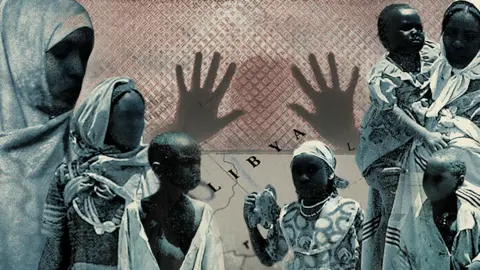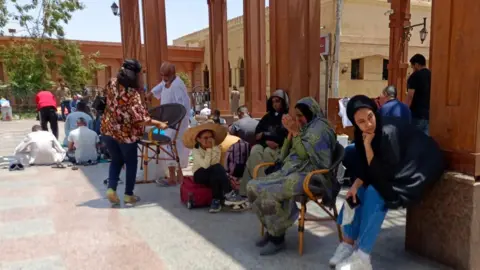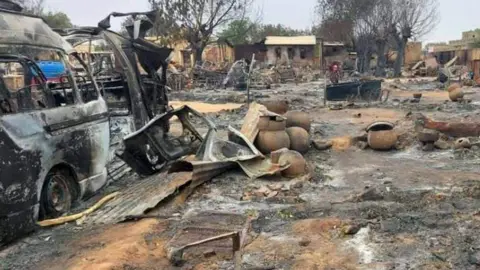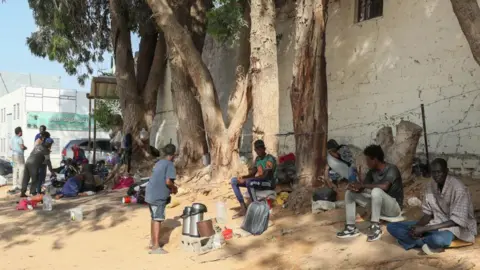 BBC
BBC“We live in terror,” Laila whispers into the phone so no one can hear. She fled Sudan with her husband and six children early last year in search of safety and is now in Libya.
Like all the Sudanese women the BBC spoke to about their experiences of human trafficking to Libya, her name has been changed to protect her identity.
Warning: This story contains details that some may find disturbing.
In a trembling voice, she explains how her home in Omdurman was raided during Sudan’s violent civil war, which broke out in 2023.
The family went to Egypt first before paying traffickers $350 (£338) to take them to Libya, where they were told life would be better and they would be able to find jobs in cleaning and hospitality.
But once they crossed the border, Laila says the traffickers took them hostage, beat them and demanded more money.
She told the BBC: “My son needed medical care after he was repeatedly beaten in the face.”
The traffickers released them after three days, without saying why. Laila thought her new life in Libya was starting to get better after the family I was able to travel west I rented a room and started working.
But one day her husband left to look for work and never returned. Then her 19-year-old daughter was raped by a man the family knew through Laila’s job.
“He told my daughter that he would rape her younger sister if she talked about what he did to her,” Laila says.
She speaks in a low voice for fear that the family will be evicted if the landlady hears about the threats.
Laila says they are now trapped in Libya: they have no money left to pay human traffickers to leave, and they cannot return to war-torn Sudan.
“We barely have any food,” she says, adding that her children are not in school. “My son is afraid to leave the house because other children often hit and insult him because he is black. I feel like I am going to lose my mind.”
 Getty Images
Getty ImagesMillions have fled Sudan since war broke out between the army and the paramilitary Rapid Support Forces in 2023. The two sides carried out a joint coup in 2021, but a power struggle between their leaders plunged the country into civil war.
Experts say more than 12 million people have been forced to leave their homes, while famine has spread to five regions, with 24.6 million people – about half the population – needing urgent food aid.
The United Nations High Commissioner for Refugees says that more than 210,000 Sudanese refugees are now in Libya.
The BBC spoke to five Sudanese families who initially went to Egypt, where they said they experienced racism and violence, before moving to Libya, believing it would be safer with better job opportunities. We contacted them through a researcher on migration issues and asylum seekers in Libya.
Salma told the BBC that she was already living in Cairo, Egypt, with her husband and three children when the Sudanese civil war broke out, but as large numbers of refugees entered the country, conditions for migrants there worsened.
They decided to move to Libya, but what awaited them there was “living hell,” Salma says.
She describes how, once they crossed the border, they were placed in a warehouse run by traffickers. The men wanted money that had been prepaid to traffickers on the Egyptian side of the border, but it never arrived.
Her family spent nearly two months in the warehouse. At some point, Salma separated from her husband and was taken to a room designated for women and children. She says here that she and her two eldest children were subjected to various forms of brutality because they wanted money.
“Their whips left marks on our bodies. They were beating my daughter and putting my son’s hands in a burning oven while I watched.
“Sometimes I wished we would all die together. I couldn’t think of any other way out.”
Salma says her son and daughter were psychologically traumatized by this experience and have suffered from urinary incontinence ever since. Then she lowers her voice.
“They would take me to a separate room, the rape room, with different men each time,” she says. “I’m carrying the child of one of them.”
Eventually, she was able to raise some money through a friend in Egypt, and the traffickers released the family.
She says the doctor then told her it was too late to have an abortion, and when her husband discovered she was pregnant, he abandoned her and her children, leaving them to sleep outdoors, eat leftover garbage cans and beg in the street.
They took refuge in a remote farm in northwestern Libya for a while, spending entire days without any food. They quenched their thirst by drinking polluted water from a nearby well.
“It breaks my heart to hear my voice [older] “Her son says he is dying of hunger,” Salma says over the phone, while her child’s cries rise in the background.
“He’s very hungry, but I don’t have anything, not even enough milk in my breasts to feed him,” she says.
 Getty Images
Getty ImagesJamila, a Sudanese woman in her mid-40s, also believes reports within the Sudanese community say a better life awaits them in Libya.
She fled previous unrest in Sudan’s western Darfur region in 2014 and spent years in Egypt before moving to Libya in late 2023. She says her daughters have been raped repeatedly since then, and were 19 and 20 when it first happened.
She told the BBC: “I sent them to work cleaning when I was sick, and then they came back at night covered in dirt and blood, and four men raped them until one of them fainted.”
Jamila says she was also raped and held captive for weeks by a much younger man, who offered her a job cleaning his house.
“He called me ‘the disgusting black one.’ He raped me and said, ‘This is what women are made for,’” she recalls.
“Even the children here treat us like monsters and witches, and insult us for being black and African. Aren’t they African themselves?” She says beautiful.
When her daughters were raped the first time, Jamila took them to the hospital and reported it to the police. But when the police officer realized they were refugees, Jamila said he withdrew the report and warned her that she would be imprisoned if the complaint was formally filed. This was in western Libya.
Libya is not a signatory to the 1951 Refugee Convention or the 1967 Protocol relating to the Status of Refugees – and considers refugees and asylum seekers “illegal migrants.”
The country is divided into two parts, and each region is run by a different government, but the situation is easier for migrants in the east where they can file formal complaints without being detained, and access health care more easily, according to the Libya Human Rights Crime Monitoring Group. .
While sexual violence is common within informal facilities run by traffickers, there is also evidence of abuse in official detention centers in Libya, especially in the West.
 Getty Images
Getty ImagesHanaa, a Sudanese woman who collects plastic bottles from rubbish bins to feed her children, says she was kidnapped in western Libya, taken to a forest, and raped at gunpoint by a group of men.
The next day, her attackers took her to a facility run by the state-funded Stabilization Support Authority. No one told Hanaa why she was being detained.
“Young men and boys were beaten and forced to completely undress while I watched,” Hanaa told the BBC.
“I stayed there for several days. I slept on the bare floor, resting my head on my plastic slippers. They would allow me to go to the toilet after hours of begging. I was repeatedly hit on the head.”
There have been numerous previous reports of migrants from other African countries being subjected to violations in Libya. The country is a major stepping stone on the way to Europe, although none of the women the BBC spoke to were planning to travel there.
In 2022, Amnesty International accused the SSA of committing “unlawful killings, arbitrary detention, interception and subsequent arbitrary detention of migrants and refugees, torture, forced labour, and other shocking human rights violations and crimes under international law.”
The report states that Interior Ministry officials in the capital, Tripoli, told Amnesty International that the ministry does not have any oversight over the State Security Service because it reports to Prime Minister Abdel Hamid Dabaiba, whose office did not respond to our request for comment.
Systematic sexual abuse of migrants occurs in official immigration detention centres, including the notorious Abu Salim prison in Tripoli, Libyan Crime Watch told the BBC.
In a 2023 report, Doctors Without Borders said there were “an increasing number of reports of sexual and physical violence, including systematic nudity, intimate body searches and rape” in Abu Salim.
The Minister of Interior and the Department of Combating Illegal Immigration in Tripoli did not respond to our request for comment.
Salma has now left the farm and moved into a new room with another family nearby, but she and her family still face the risk of eviction and abuse.
She says she can’t go home because of what happened to her.
“I bring shame to my family,” she says. “I’m not sure they will welcome my body.” “If only I knew what was waiting for me here.”
You may also be interested in:
 Getty Images/BBC
Getty Images/BBChttps://ichef.bbci.co.uk/news/1024/branded_news/8454/live/7adc4920-d7ee-11ef-94cb-5f844ceb9e30.jpg

